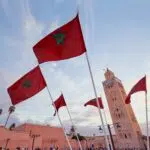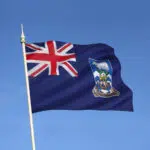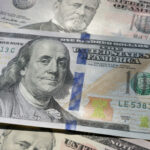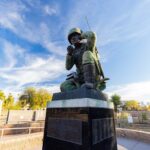Pakistan Independence Day on August 14 could be considered a double day of liberation. Muslim Indians also fought to be free of British rule and later re-armed to battle for their own nation-state, present day Pakistan — once part of the Indian subcontinent. After the British put down the Indian Rebellion of 1857, the Crown assumed full control during the British Raj period. This lasted until Pakistan’s independence in 1947. The Mountbatten Plan split Pakistan (comprised of West and East Pakistan) from India, creating an independent Muslim nation. In 1971, East Pakistan gained its own independence, becoming known as Bangladesh. Today, West Pakistan is known simply as Pakistan.
The main Independence Day ceremony ceremony is organized in Islamabad, where the national flag is hoisted at the Parliament and Presidency buildings. This is follow up by the national anthem and widely circulated and televised speeches by the President and Prime Minister of Pakistan.
Pakistan Independence Day is a National Holiday in Pakistan.
2021 marks the 74th Independence Day for the country.
When is Pakistan Independence Day 2025?
“Unity, Faith, and Discipline” is the guiding principle and national motto of Pakistan. The country celebrates its Independence Day on August 14.
History of Pakistan Independence Day
The creation of Pakistan is an astounding one, and quite a unique occurrence in modern history.
Pakistan, India, and Bangladesh were originally part of one giant territory called the Indian subcontinent. Ever since the religion of Islam was introduced and embraced in the subcontinent, peace was disturbed due to clashes and the oppression of Muslims by Hindus. To safeguard the Muslim minority, intellectual thought and philosophies were set into motion after the War of Independence in 1857.
The circumstances were not in favor of the Muslim community but, with courage and faith, the downtrodden Muslims residing in the subcontinent were successful in actualizing their dreams of freedom. In 1906, the All-India Muslim League was founded and, on October 1 the same year, the first delegation of 36 Muslim leaders presented their demand to the viceroy of India at Simla for a separate state for Muslims.
The concept of Pakistan and liberation for Muslims would have remained a pipe dream, had it not been for one man’s superhuman efforts and struggle to make it a reality. Muhammad Ali Jinnah was a barrister and politician, who later on became the father of the nation of Pakistan. Jinnah was the leader of the All-India Muslim League from 1913 onwards, until Pakistan’s independence.
Allama Muhammad Iqbal was another visionary who propelled the idea of the separation of Muslims from India. In his presidential address on December 29, 1930, at Allahabad, Iqbal proposed the idea. The Allahabad Address is now revolutionary in history. The name ‘Pakistan’ first appeared in a pamphlet called “Now Or Never” in 1933.
It was quite a big day in history. Prominent Muslim leaders from all over India attended the session, and there was finally a legitimate solution to the centuries-old struggle of Muslims to gain sovereignty and freedom. On February 20, 1947, the turning point happened when British Prime Minister Clement Attlee made an announcement to grant India complete self-governance by June 1948. After multiple consultations with the British government and Congress leaders, the last viceroy of India, Lord Mountbatten, released the ‘June Plan.’
Both India’s Congress and the Muslim League welcomed Mountbatten’s plan. In July 1947, the British parliament introduced the Indian Independence Act. Separate provisional governments were established for Pakistan and India on July 20. Finally, the great subcontinent of British India was partitioned into the two countries of India and Pakistan on August 14, 1947.
The partition was full of bloodshed and carnage. Since the inception of the idea of a separate nation for Muslims, Hindu brutality intensified and there was great opposition to Jinnah and the rest of the Muslim leaders’ ideas to create a sovereign identity for Muslims. Lineages and families were destroyed and tales of partitions are still collected and archived today.
“You are free; you are free to go to your temples. You are free to go to your mosques or to any other places of worship in this State of Pakistan. You may belong to any religion, caste or creed — that has nothing to do with the business of the state.” ― Muhammad Ali Jinnah
Pakistan Independence Day timeline
The Government of India Act results in the British Crown assuming direct control over much of the Indian subcontinent, including the areas known today as Bangladesh and Pakistan.
It's the end of the British Raj (the period of British rule over India, beginning in 1858) and, in the aftermath, divisions in the subcontinent results in Pakistan's hard-fought win in gaining independence.
The founding leader of Pakistan, Muhammed Ali Jinnah, dies.
Pakistan transitions from a dominion to a republic, officially becoming known as the Islamic Republic of Pakistan.
Traditions of Day
Citizens of Pakistan celebrate Independence day zealously. The colors for the day are the green and white of Pakistan’s flag. The country’s flags are seen everywhere and fireworks displays are enjoyed. Flag hoisting ceremonies are held publicly and at private institutions across the country. Schools and universities arrange declamation contests, art exhibitions, national song recitals, and sports marathons to celebrate. Special programs are also scheduled for the observance of this day.
The president and prime minister deliver special speeches, recalling the sacrifices of the nation’s forefathers who laid down their lives for the country. The district and local authorities actively plan and execute events to express patriotism and add colors to the day. Citizens participate in face painting, donning the country colors, dressing up elaborately, lighting fireworks, and celebrating all things Pakistan.
Pakistan Independence Day FAQs
What are major sectors of the economy of Pakistan?
Agriculture, Industry, Services
What is the most famous thing about Pakistan?
- Pakistan is the world’s 26th largest economy
- It has the world’s seventh largest standing force
- Fourth Smartest People in the world
How to Observe Pakistan Independence Day
Wear Pakistan's national colors
The Pakistani flag displays its national colors of green and white. Green symbolizes prosperity and good fortune and white represents peace. Together, these colors can radiate positive energy. So, if you share Pakistani heritage, hoist that flag high!
Remember those who died for freedom
Pakistani independence was a hard fought battle for sovereign rights and religious freedom. Pause for the cause and remember those who died to liberate Pakistan.
Attend a local festival
All over the world, there are those with Pakistani heritage who celebrate Pakistan Independence Day with bursts of color, great food, lively music, and warm friends. Get inspired and create your own mini-festival at home!
5 Incredible Pakistan Facts That Will Instantly Make You The Smartest Person In The Room
Malala Yousafzai
A Taliban gunman tried to murder this Pakistani teenager-turned-activist as she rode a bus home from school. Two years later Malala received the Nobel Peace Prize for her global efforts on behalf of girls striving to receive an education.
It's home to the Eighth Wonder of the World
As a testament to China-Pakistan friendship, the Karakoram Highway, connecting the two countries, has an altitude 4,800 meters. It's the world's highest road blessed with picturesque, natural views, including mountains, glaciers and rivers.
Even after independence, it follows this British custom
On Pakistan Independence Day, there are "changing of the guard" ceremonies at national monuments, including the mausoleum of Muhammad Ali Jinnah who is considered to be the founder of Pakistan.
It's a night for light
From candles in their homes, to oil lamps on the streets, to extravagant fireworks displays, Pakistanis pay homage to the bright light of independence during the evening hours of Pakistan Independence Day.
The world's largest volunteer ambulance service is there — who knew?
Since 1997 the Edhi Foundation has carried the distinction of overseeing the world's largest, volunteer-run ambulance service — which happens to be located in Pakistan.
Why Pakistan Independence Day is Important
Independence means celebration
Countries around the world have fought hard to win freedom and status as independent nations. The Pakistanis not only fought for independent sovereignty but they also battled for religious freedom. On Pakistan Independence Day, Pakistanis celebrate their many personal, religious and national freedoms.
Muhammad Ali Jinnah led the fight for independence
Several key leaders pushed for Pakistani independence — Muhammad Ali Jinnah being key among them. Jinnah, Karachi-born and London-trained as a barrister, became an organizing voice for independence in Pakistan as part of the Indian National Congress during the early years of the last century. Later, Jinnah helped to form coalitions fighting for Pakistan to be an independent Muslim nation-state. Today Muhammad Ali Jinnah is revered as the first governor-general of Pakistan, who was instrumental in shaping the country's policies and priorities after independence.
Religious freedom is guaranteed under the constitution
Imagine being forbidden to practice your religion because it's illegal. Pakistan Independence Day marks gratitude for the nation's Muslims because their right to freely practice Islam is guaranteed under their constitution. But in Pakistan today, there are several Muslim sects, as well as other religious minorities, who face persecution and daily threats of violence or death.
Pakistan Independence Day dates
| Year | Date | Day |
|---|---|---|
| 2025 | August 14 | Thursday |
| 2026 | August 14 | Friday |
| 2027 | August 14 | Saturday |
| 2028 | August 14 | Monday |
| 2029 | August 14 | Tuesday |












